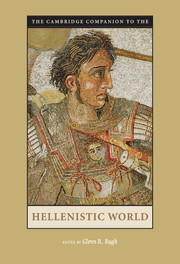Book contents
- Frontmatter
- Introduction
- 1 Alexander the Great and the Creation of the Hellenistic Age
- 2 The Hellenistic Kingdoms
- 3 The Polis and Federalism
- 4 Hellenistic Economies
- 5 The Hellenistic Family
- 6 History and Rhetoric
- 7 Material Culture
- 8 Hellenistic Art: Two Dozen Innovations
- 9 Language and Literature
- 10 Greek Religion: Continuity and Change in the Hellenistic Period
- 11 Philosophy for Life
- 12 Science, Medicine, and Technology
- 13 Hellenistic Military Developments
- 14 Greeks and Non-Greeks
- 15 Recent Trends and New Directions
- Hellenistic Dynasties
- Works Cited
- Index
10 - Greek Religion: Continuity and Change in the Hellenistic Period
Published online by Cambridge University Press: 28 November 2007
- Frontmatter
- Introduction
- 1 Alexander the Great and the Creation of the Hellenistic Age
- 2 The Hellenistic Kingdoms
- 3 The Polis and Federalism
- 4 Hellenistic Economies
- 5 The Hellenistic Family
- 6 History and Rhetoric
- 7 Material Culture
- 8 Hellenistic Art: Two Dozen Innovations
- 9 Language and Literature
- 10 Greek Religion: Continuity and Change in the Hellenistic Period
- 11 Philosophy for Life
- 12 Science, Medicine, and Technology
- 13 Hellenistic Military Developments
- 14 Greeks and Non-Greeks
- 15 Recent Trends and New Directions
- Hellenistic Dynasties
- Works Cited
- Index
Summary
The social, economic, and political changes occasioned by Alexander’s expeditions and the wars and policies of his successors brought changes also to religious traditions and practices, but the extent of these changes varied greatly for Greeks living in different parts of the Hellenistic world and in different kinds of cities. Athenians, for example, very conservatively preserved their centuries old religious cults, practices, and festivals, and a fifth-century b.c.e. Athenian finding himself in second century b.c.e. Athens would have found the religious environment quite familiar, with only a few new and disturbing elements. In Alexandria of the same period, by contrast, there was a most unclassical heterogeneity of Greek, pseudo-Greek, Egyptian, and Jewish deities and religious practices, all in a multiethnic and multicultural cosmopolitan environment more like that of a modern metropolis than that of the Classical Greek city-state. We have at Alexandria, by design, a mixed population of Macedonians, Greeks, Egyptians, Jews, and others, and for the first time in the Greek world, all the citizens and residents of one city were not expected, as a matter of course, to be worshiping the same state deities in common sacrifices and festivals. This was largely the result of bringing together several nationalities to create one new city and of the nonrestrictive religious policies of its rulers. The changes characteristic of Hellenistic Greek religion largely emanated from this religious multiculturalism in Alexandria and other similar metropolitan centers and did eventually affect all parts of the Greek world but some more so than others, some earlier than others, and some differently from others, all to the extent that it is erroneous to imagine a single form of Hellenistic religion that was practised by all or even a majority of Greeks at any one time.
- Type
- Chapter
- Information
- The Cambridge Companion to the Hellenistic World , pp. 208 - 222Publisher: Cambridge University PressPrint publication year: 2006
- 11
- Cited by



